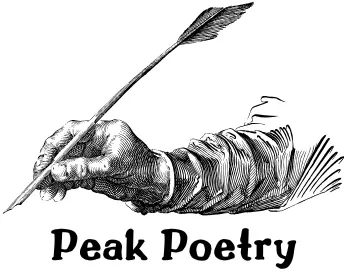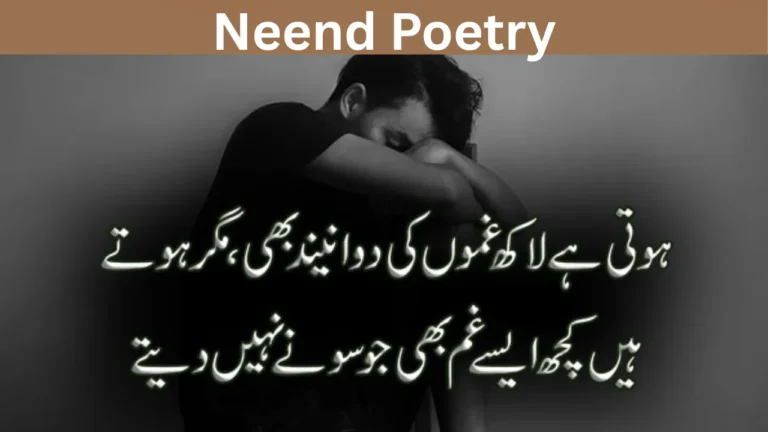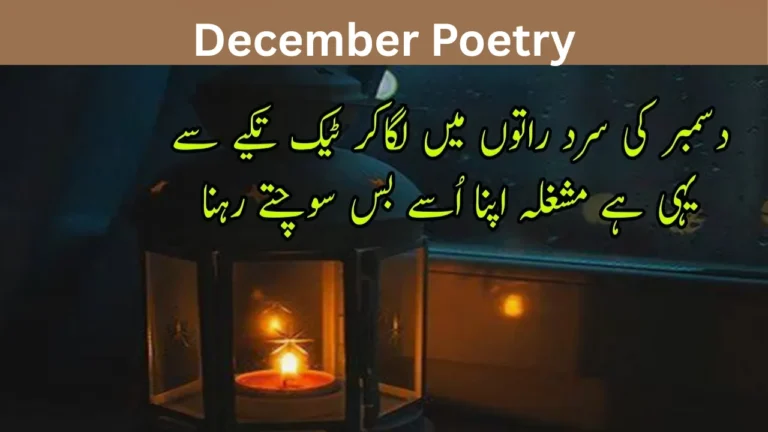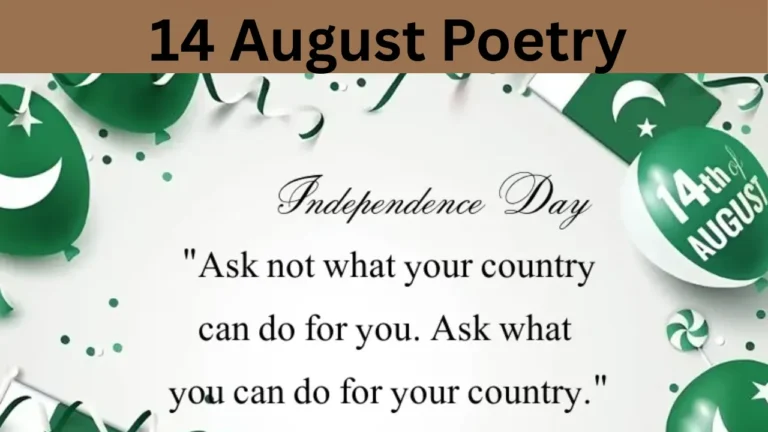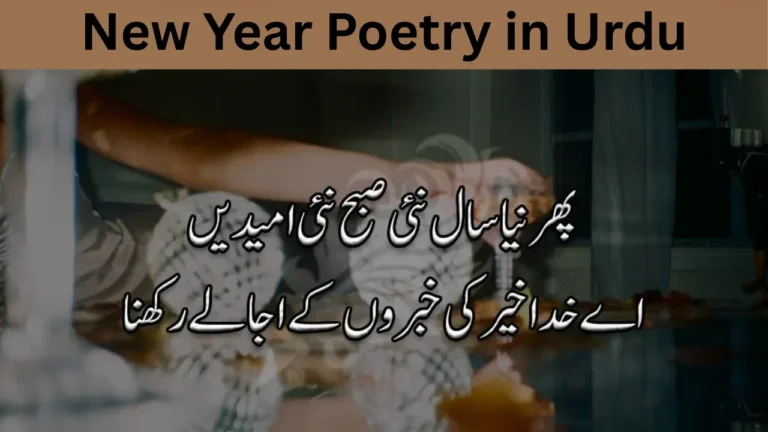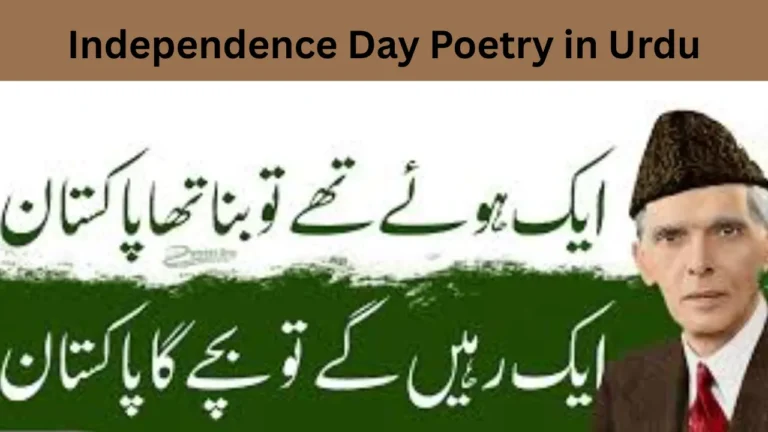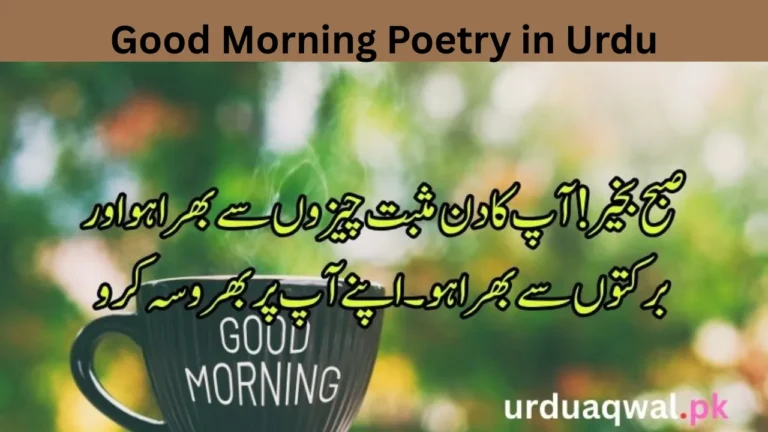Welcome Poetry in Urdu: A Celebration of Warmth and Respect
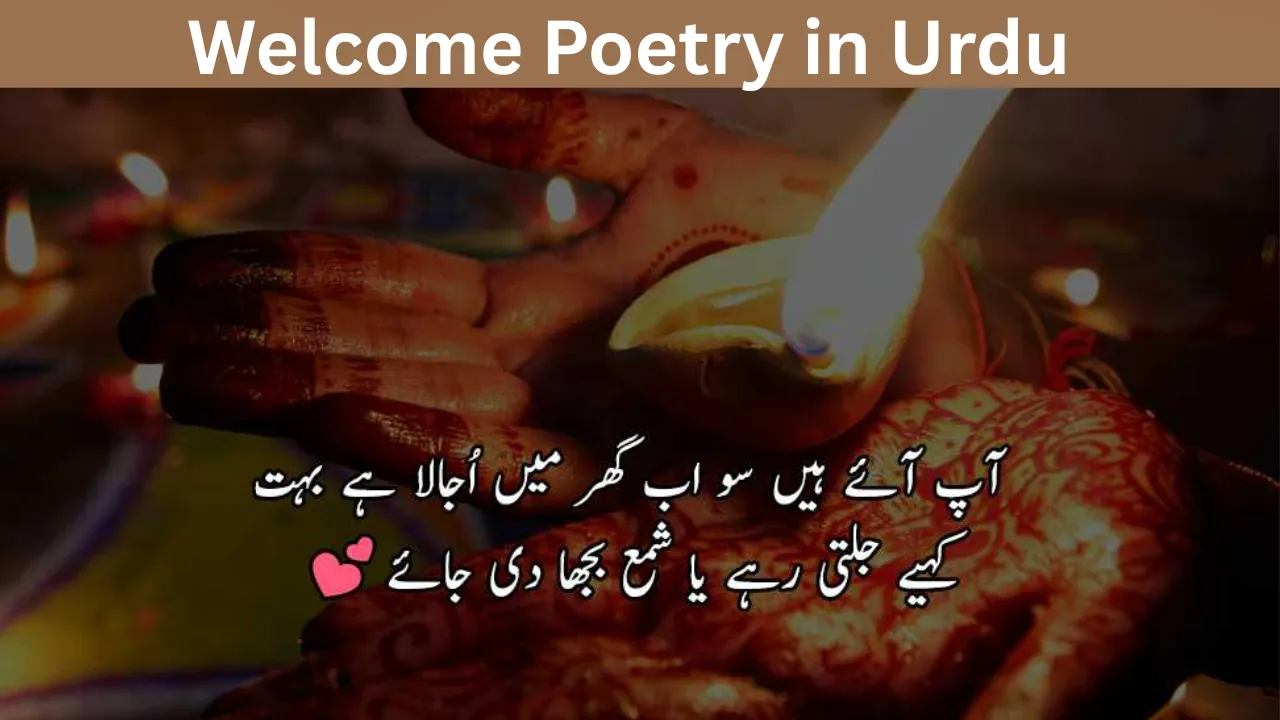
In the world of poetic expression, few genres carry as much grace and cultural depth as welcome poetry in Urdu. This beautiful form of verse holds a special place in social gatherings, official events, school functions, and literary evenings. It serves not just as a warm gesture but also a powerful way to connect hearts through words.
Urdu poetry has long been a language of emotions, politeness, and elegance. Whether it’s ghazals, naats, or marsiyas, the rhythm and emotion of Urdu verses can touch anyone. Among these, welcome poetry stands out for its unique purpose—celebrating the arrival of guests and making them feel special.
As we explore this poetic form, it’s also worth mentioning the beauty of regional poetry like Janan Pashto Poetry: A Deeply Emotional Expression of Love, which similarly reflects heartfelt emotions in a distinct cultural voice.
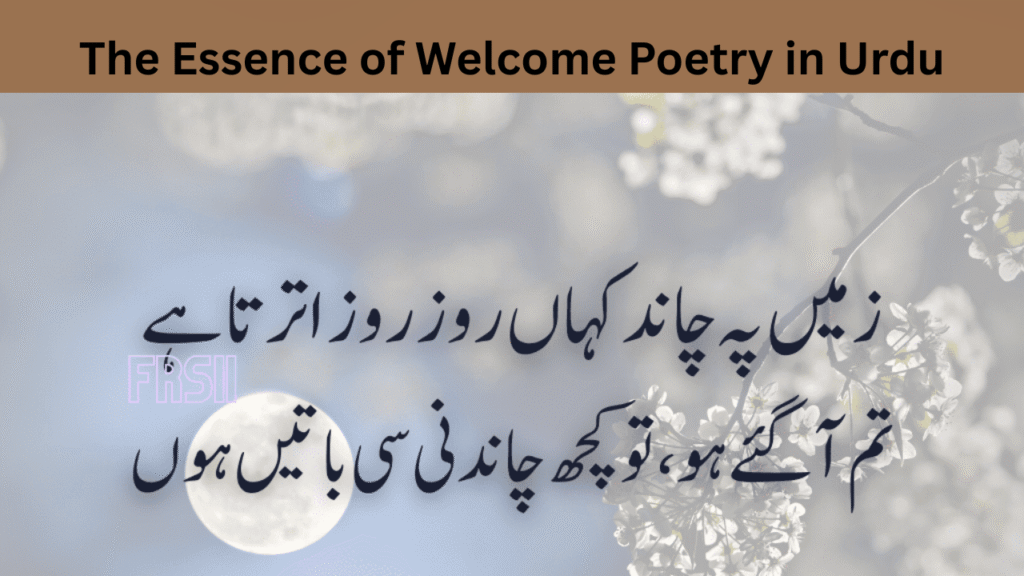
The Essence of Welcome Poetry in Urdu
Welcome poetry in Urdu is not just a poem. It’s an expression of warmth, love, and hospitality. Whether in schools, weddings, or religious events, these verses set the tone for celebration.
Here is a small, soft piece of welcome poetry:
آج کی محفل میں کچھ خاص بات ہے
آپ کی آمد سے کچھ نئی بات ہے
خوشبو پھیلی ہے، چمک اُٹھا ہے سماں
ایسا لگا جیسے کوئی خوشبو آ گئی ہو یہاں
This form of poetry uses metaphors of light, fragrance, and spring to describe the joy a guest brings. The words are graceful, the meaning deep.
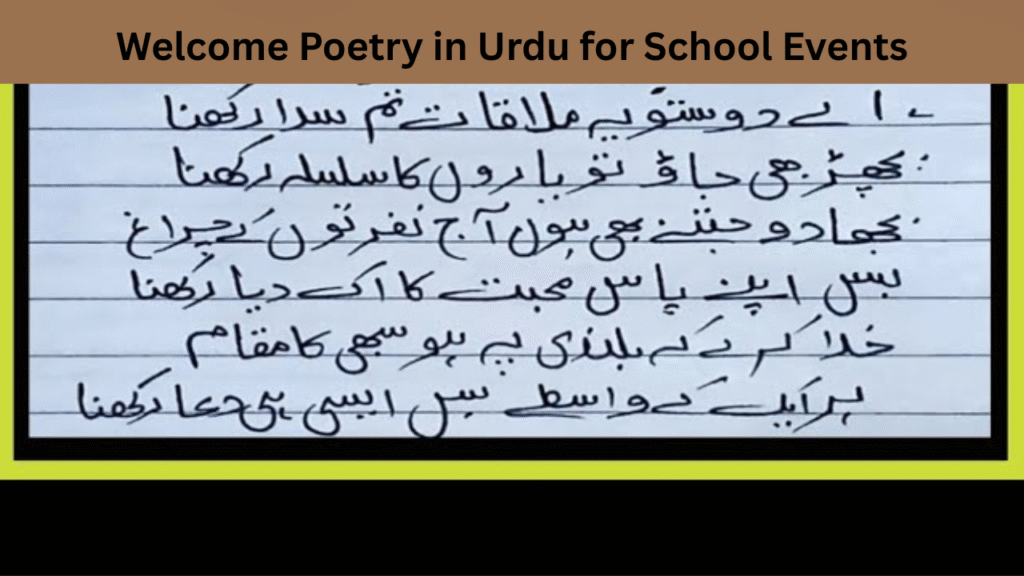
Welcome Poetry in Urdu for School Events
Children often learn welcome poetry in primary grades. Teachers encourage them to recite short, clear lines during annual days. This practice boosts confidence and teaches the value of respect.
By the time students reach middle school, they often write their own couplets. This helps them develop language skills and cultural awareness. Schools sometimes hold competitions to find the most touching poem, creating lasting memories for all participants.
Here is an example for a school function:
آپ کی آمد نے رونق بڑھا دی ہے
یہ محفل آج سجی سجی سی لگتی ہے
مدرسہ ہمارا ہے، مگر روشنی آپ سے ہے
خوش آمدید کہتے ہیں، دل کی گہرائی سے
Such poetry teaches children the values of kindness and hospitality. It also boosts their confidence in public speaking.
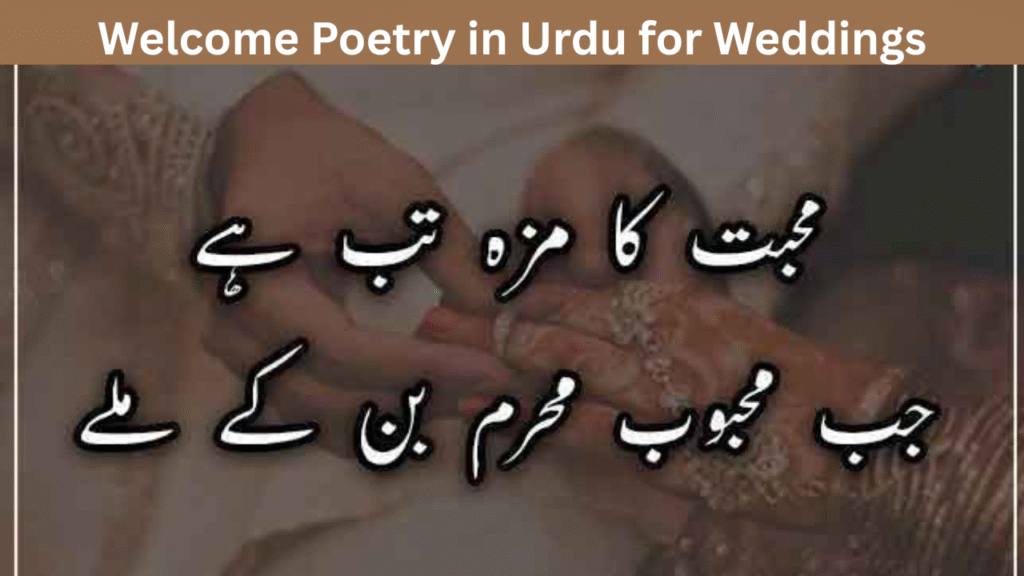
Welcome Poetry in Urdu for Weddings
Weddings in South Asia are grand occasions filled with music, dance, and poetry. To honor the bride, groom, and their families, hosts frequently include welcome poetry in their programs. These verses add an elegant touch that modern invitations and banners alone cannot achieve.
When guests arrive, a reciter often welcomes them with a short poem. This moment bridges generations and underscores communal joy. It reminds everyone that weddings are as much about unity as celebration.
Here’s a wedding-themed Urdu welcome poem:
محفل میں چار چاند لگ گئے ہیں آج
جب سے آپ کی آمد ہوئی ہے آج
دولہا، دلہن خوش ہیں بے حد
کہ آپ کی دعاؤں سے جُڑا ہے ان کا کل
These verses are also used in wedding cards, WhatsApp statuses, and event banners.
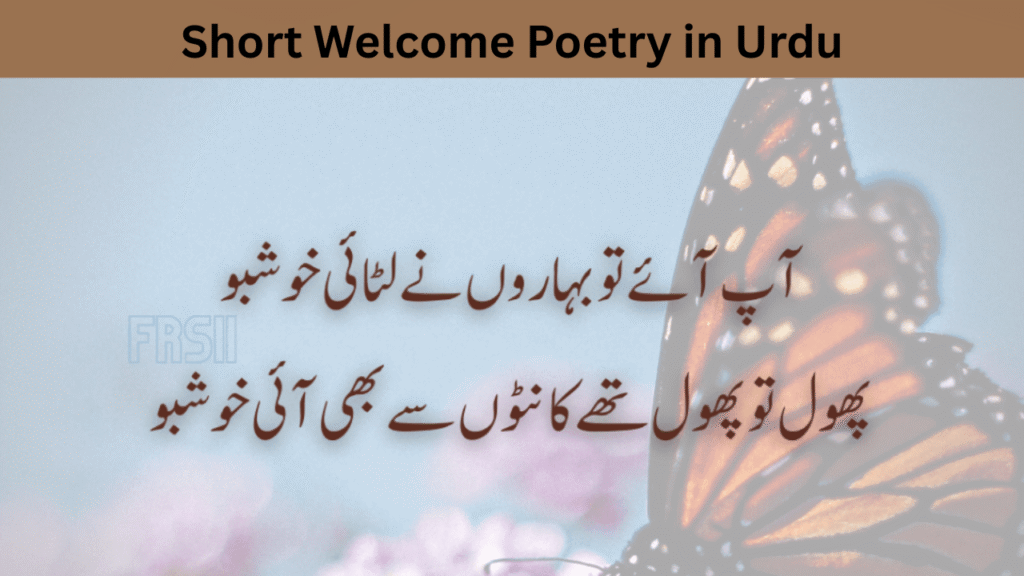
Short Welcome Poetry in Urdu
Sometimes, you need something quick and memorable. Short welcome poetry in Urdu works perfectly for greeting cards, stage introductions, or digital invites.
Here are some 2-line Urdu welcome poems:
خوش آمدید کہتے ہیں ہم دل سے آپ کو
محفل میں بچھایا ہے پھولوں کا راستہ آپ کو
آپ کی آمد سے سجی ہے یہ محفل ہماری
خوشبو بکھری ہے جیسے بہار آئی ہو ساری
تشریف لا کر آپ نے دل جیت لیے
یہ محفل اب آپ کی رہین منت رہے
These short verses are easy to use and bring instant joy to any event.
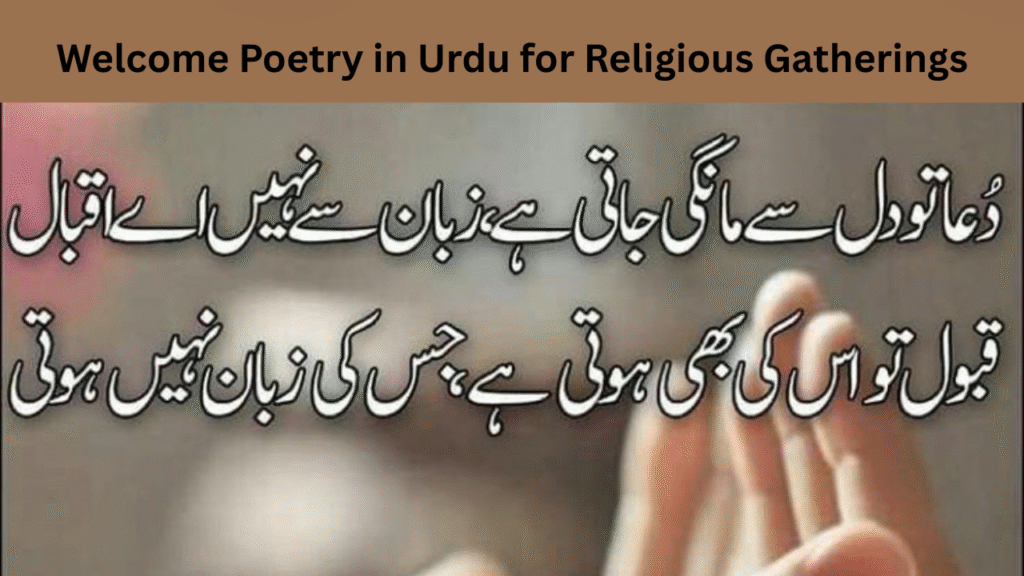
Welcome Poetry in Urdu for Religious Gatherings
In religious settings, the language of welcome poetry in Urdu becomes more spiritual. It may include words like noor, fazilat, and barkat to honor the presence of scholars or elders.
Here is a spiritual-style welcome poem:
نور آیا ہے، روشنی ساتھ لایا ہے
یہ جو مہمان آیا ہے، دل کو بہایا ہے
اللہ کا شکر ہے، یہ دن دیکھنے کو ملا
یہ عظیم ہستی آج ہمارے ساتھ آیا ہے
Such poetry is heard at Milad, Juloos, or Jummah events, where respect and tradition go hand in hand.
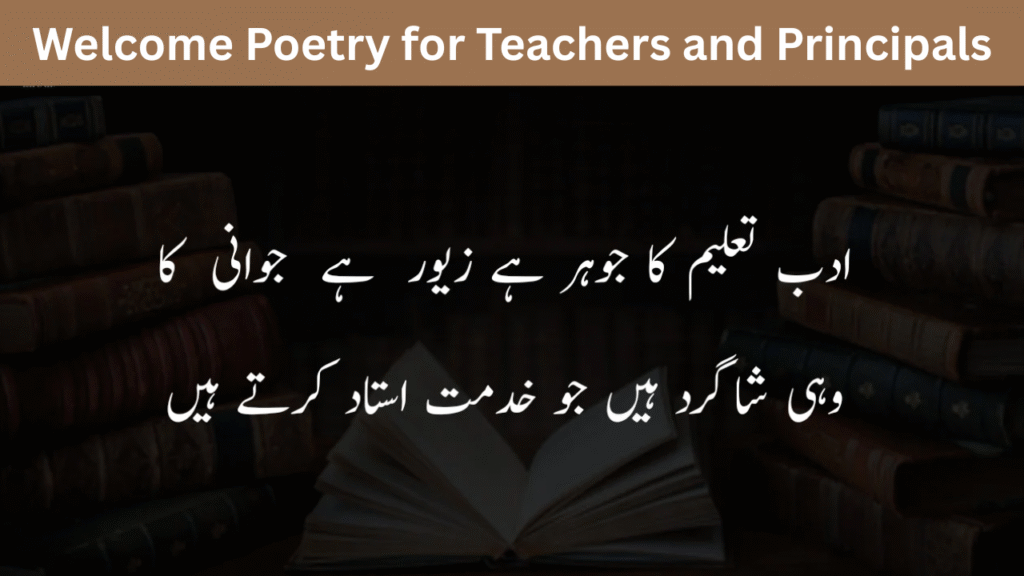
Welcome Poetry for Teachers and Principals
Students often recite welcome poetry in Urdu to honor their teachers or principals during farewell parties or school events. These poems are full of admiration.
ہماری رہبری کی روشنی آپ سے ہے
زندگی کی ہر اچھی بات آپ سے ہے
استاد محترم، آپ کو سلام کرتے ہیں
دل کی گہرائیوں سے خوش آمدید کہتے ہیں
This style builds emotional bonding between students and educators, highlighting how language can express gratitude.
When and Where Welcome Poetry is Used
Here’s a table to show where and how welcome poetry in Urdu is commonly used:
| Event Type | Style of Poetry | Purpose |
|---|---|---|
| School Annual Day | Respectful and playful | To greet guests and parents |
| Wedding Ceremony | Joyful and colorful | To honor bride, groom, and elders |
| Religious Gathering | Spiritual and formal | To welcome religious personalities |
| Political or Cultural | Bold and expressive | To show pride in someone’s presence |
| Teacher Appreciation | Emotional and sincere | To thank educators warmly |
Each setting has its own poetic tone, but the emotion behind it is always heartfelt.
Urdu Welcome Poetry for Social Media
With the rise of social media, welcome poetry is now used on platforms like WhatsApp, Facebook, and Instagram. People share it in stories and reels to welcome friends or followers.
Here’s a poetry line perfect for a status update:
آج دل خوش ہے، محفل روشن ہے
کیونکہ آپ ہمارے درمیان موجود ہیں
خوش آمدید!
The charm of welcome poetry in Urdu remains timeless, no matter the medium.
English and Urdu Poetic Connection
Just like Urdu, English also celebrates short poetic forms. English Poetry 2 Lines: Small Verses with Deep Emotions shows how a few simple words can leave a deep impact—something that welcome poetry in Urdu also excels at.
Both traditions, though different in language, serve the same emotional purpose: to touch hearts.
Short and Simple Welcome Poetry for Cards and Posters
In modern times, people often prefer short poems that fit on cards, banners, or WhatsApp statuses. These short welcome poetry in Urdu lines are easy to share and remember.
Here are a few examples:
آپ کی آمد سے بہار آ گئی
دلوں میں خوشبو سی چھا گئی
تشریف لا کر آپ نے رونق بڑھائی
یہ محفل آپ کی منتظر تھی، سچائی
دیکھ کر آپ کو دل کو قرار آ گیا
جیسے بچھڑے ہوئے کو یار آ گیا
These verses carry rhythm and are perfect for greeting elders, friends, or guests in any setting.
Final Thoughts
Welcome poetry in Urdu is a treasure of South Asian culture. It brings people together, honors traditions, and makes every event more beautiful. Whether it is two lines or eight, these poetic expressions leave a strong emotional effect.
From wedding halls to school stages, these verses offer more than greetings—they give the guest a place of pride and love. They teach children to speak with warmth, adults to write with grace, and society to maintain the language of respect.
If you ever want to welcome someone in a special way, don’t just say “hello”—say it through welcome poetry. Let your words carry the fragrance of your heart.
